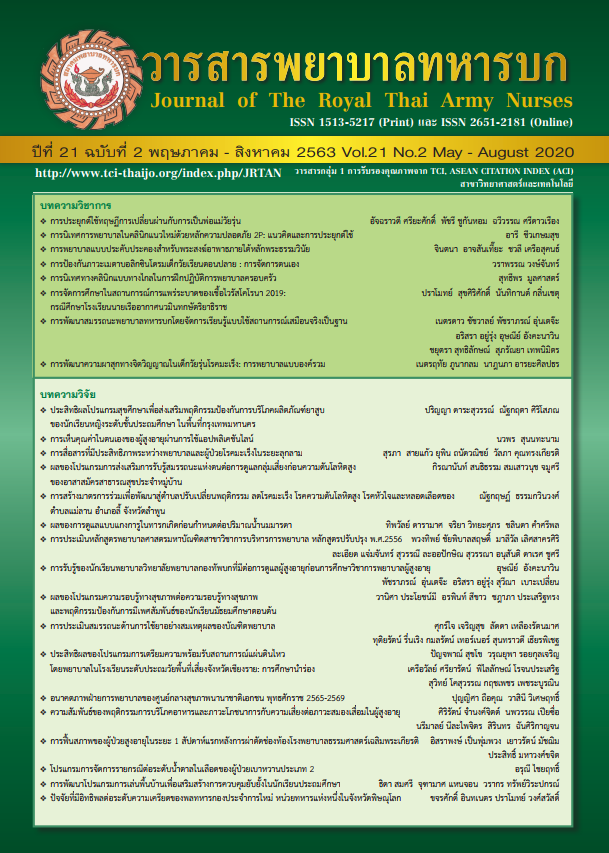Educational Management in the Coronary Epidemic Situation 2019: A Case Study of Navaminda Kasatriyadhiraj Royal Air Force Academy
Keywords:
Educational Management, Corona Virus 2019, Navaminda Kasatriyadhiraj Royal Air Force AcademyAbstract
At the end of 2019, an epidemic occurred in China which is caused by a new strain of the corona virus 2019. This disease has flu-like symptoms but with more severe symptoms, and easier to spread. Some patients may have severe pneumonia to the death. And then the disease spread quickly. In every country in the world, many people are infected and dying. Thailand is also affected by this disease. The government announced that educational institutions at all levels should stop education to prevent the spread of the disease. Navaminda Kasatriyadhiraj Royal Air Force Academy as an educational institution under the Royal Thai Air Force is responsible for providing education to air cadets and sees the importance of safety in the health of students, therefore have guidelines for education that are not at risk of spreading this disease, And to be a guideline for education in the event of an epidemic in the future. By studying the theory of learner-centered education, and designed 3 types of education which are studying in the normal room by dividing area between the instructor and learners, studying in the spaced room of the learners, and learning online. The result is that each type of academic achievement has similar results and the satisfaction assessment of learners on online learning received the highest satisfaction of 84 percent.
Downloads
References
Xintian X, Ping C, Jingfang W, Jiannan F. Evolution of the novel coronavirus from the ongoing Wuhan outbreak and modeling of its spike protein for risk of human transmission. Science China Life Sciences. 2020; 63(3): 457-60.
Chun L, Yanling Y, Linzhu R. Genetic evolution analysis of 2019 novel coronavirus and coronavirus from other species. Infection, Genetics and Evolution. 2020:82: 104285.
Punniththa M. Using of Education Technology for Efficiently Learning Procedure in this 4.0 Era (21st century). MBU Education Journal: Faculty of Education Mahamahut Buddhist University. 2019; 7(2): 41-52. (in Thai)
Renumas M. Efficient teaching and learning in higher education. Southern Technology Journal. 2016; 9(2): 169-76. (in Thai)
Metira P. 21st Century Skills and 21st Century Skills Integration into the English for Aviation course. NKRAFA Journal of Humanities and Social Sciences. 2019; 20:36-42. (in Thai)
Wannarat S, Raveewon I, Jirapa S. Learning by Using Concept Based Instruction. Journal of the Royal Thai Army Nurses. 2018; 19(3): 10-8. (in Thai)
Anut W, Pakornchai S. Learner-centered Approach is the Achievement Management of the Focusing on Mathematics, Sciences in Bunditpatanasilpa Institute. Journal of Reseacch and Delelopment Valaialongkorn. 2018; 13(2): 182-92. (in Thai)
Margaret L. N.Investigating TPACK: Knowledge growth in teaching with technology. Journal of Educational Computing Research. 2011; 44(3): 299-317.
Wang JH, Li S, Narueporn W. Efficient class lectures. Khon Kaen University Journal of Education. 2015; 38(3): 1-9. (in Thai)
Navaminda Kasatriyadhiraj Royal Air Force Academy. Cirriculum of NKRAFA (Revised version 2015). Bangkok: Academic Faculty Printing; 2015. (in Thai)
Jintana A, Saisamorn C. ASEAN Community and Thai Health System. Journal of the Royal Thai Army Nurses. 2016; 17(3): 10-6. (in Thai)
Academic Faculty, NKRAFA. Assessment results of satisfaction with online learning. 2020.(in Thai)
Downloads
Published
How to Cite
Issue
Section
License
บทความหรือข้อคิดเห็นใดใดที่ปรากฏในวารสารพยาบาลทหารบกเป็นวรรณกรรมของผู้เขียน ซึ่งบรรณาธิการหรือสมาคมพยาบาลทหารบก ไม่จำเป็นต้องเห็นด้วย
บทความที่ได้รับการตีพิมพ์เป็นลิขสิทธิ์ของวารสารพยาบาลทหารบก
The ideas and opinions expressed in the Journal of The Royal Thai Army Nurses are those of the authors and not necessarily those
of the editor or Royal Thai Army Nurses Association.






